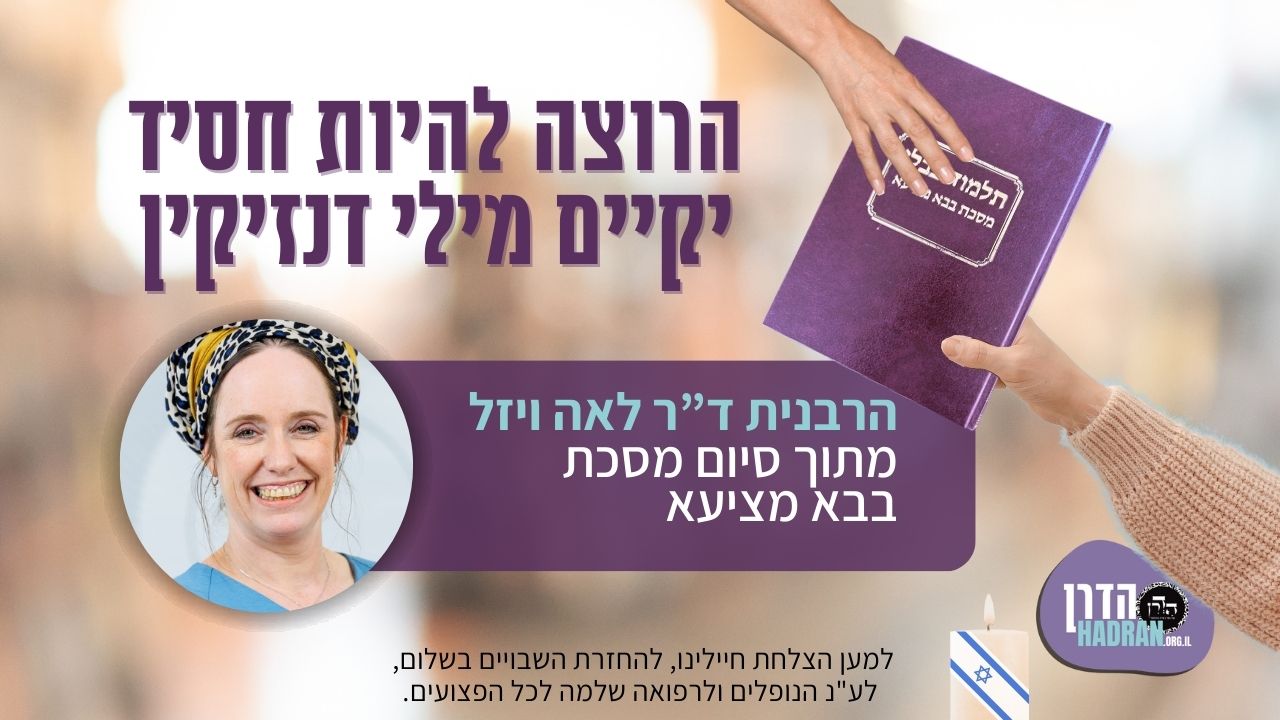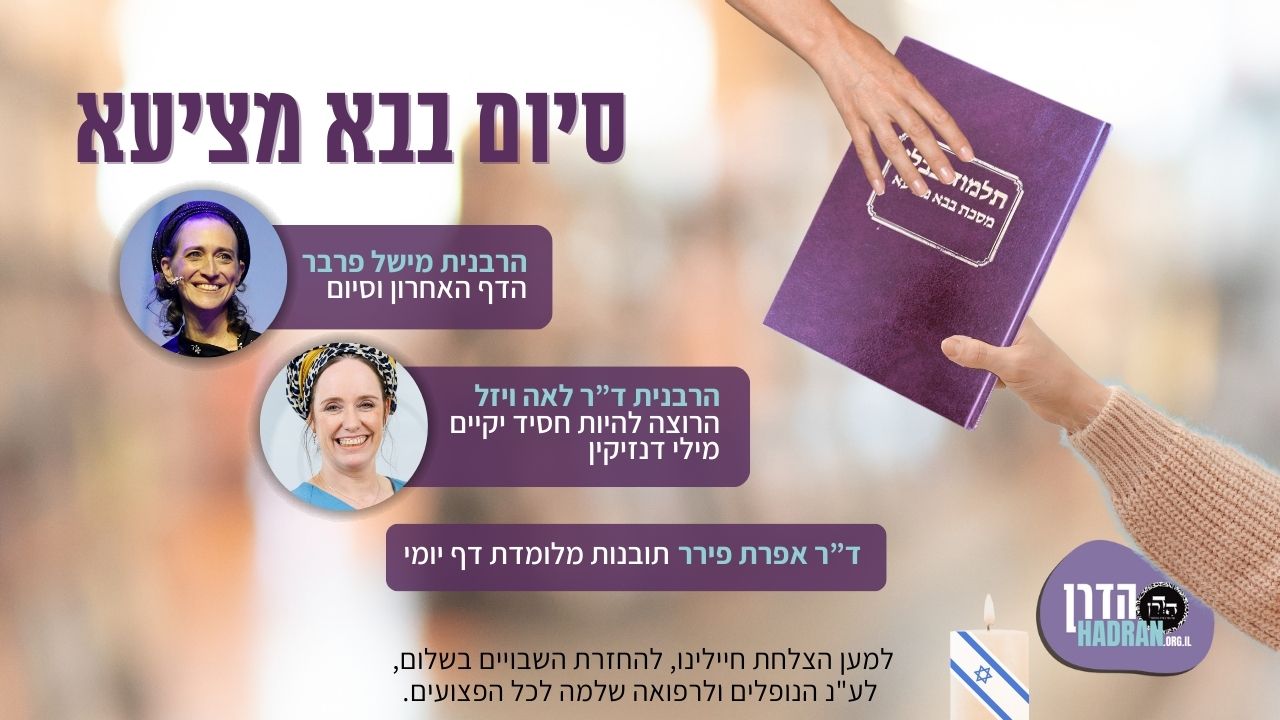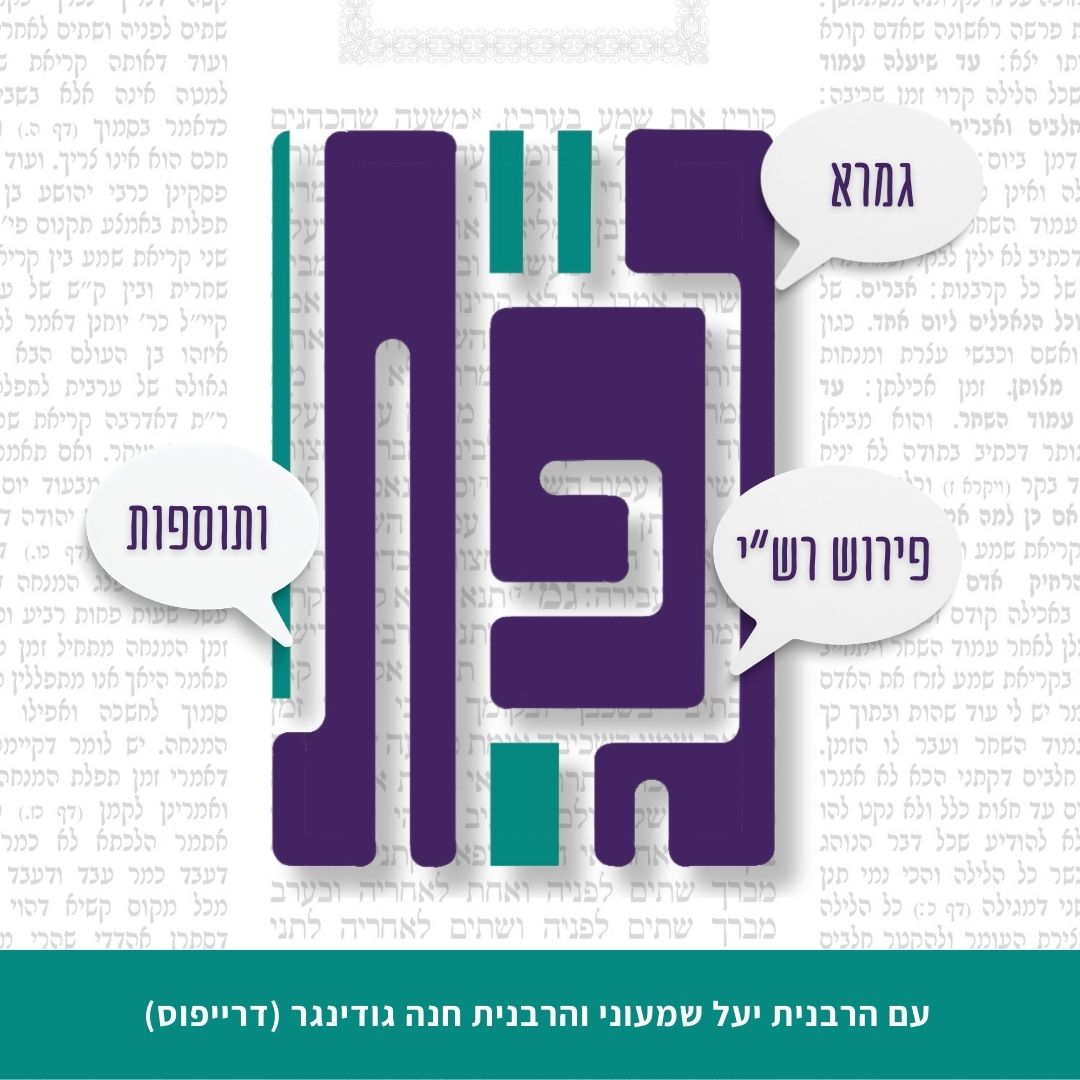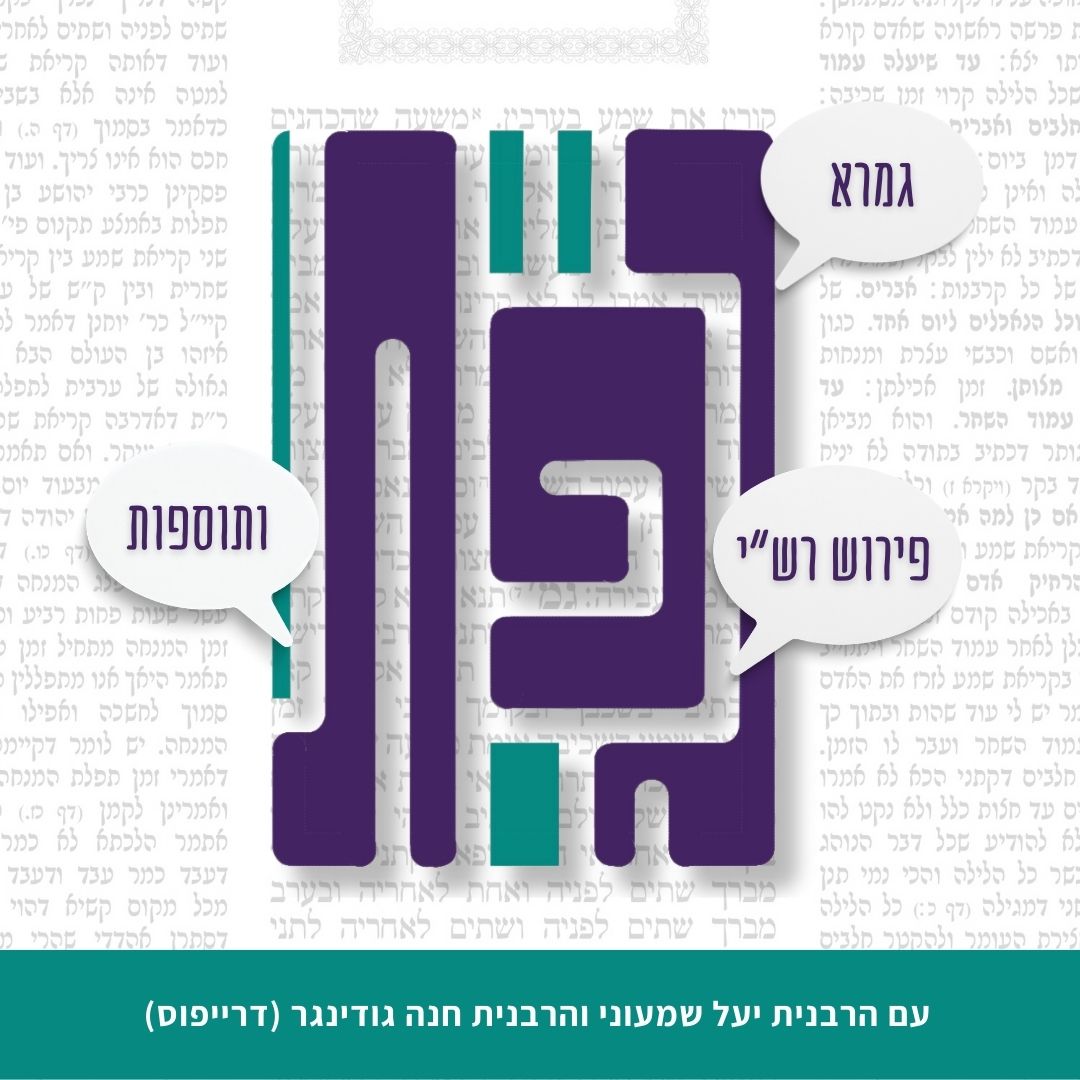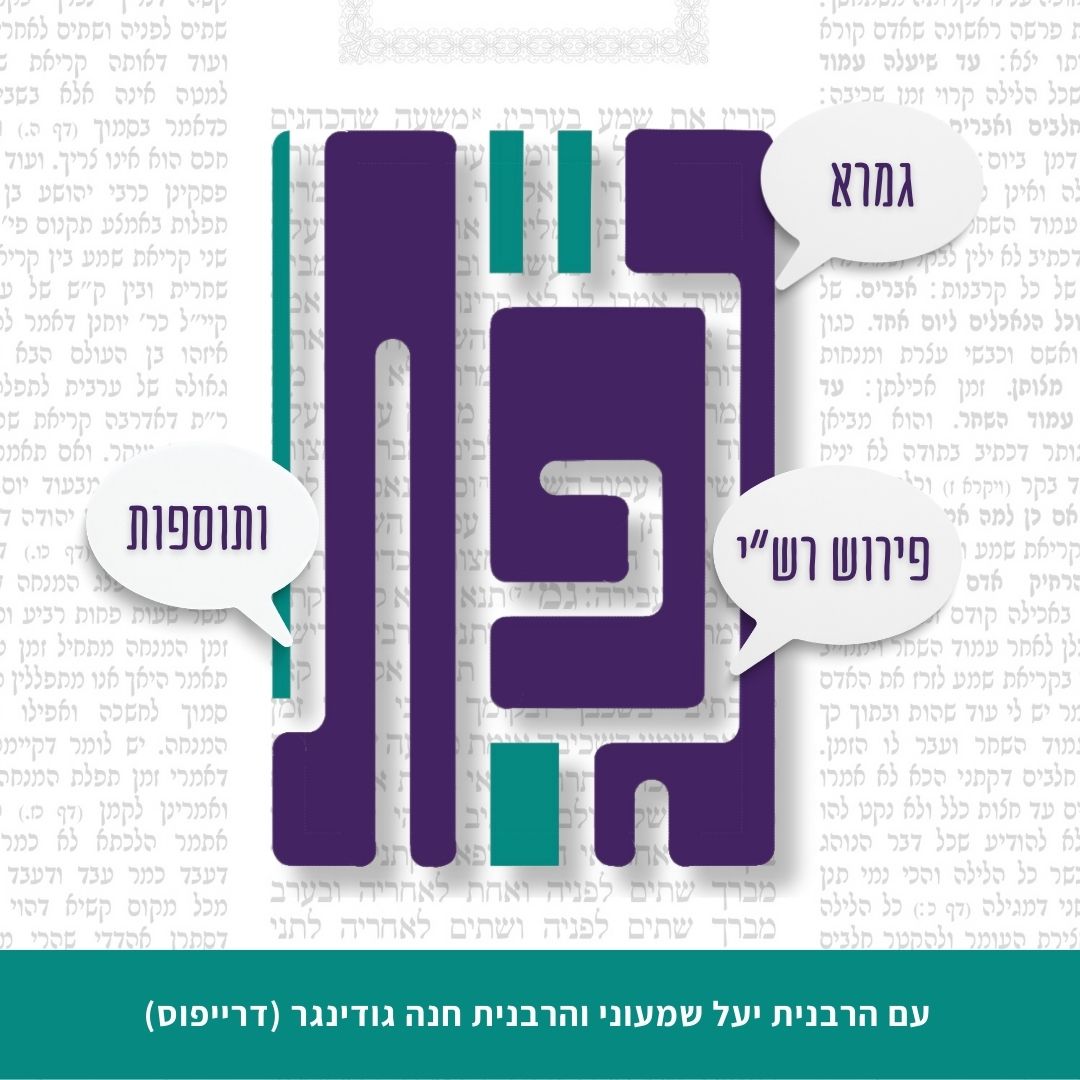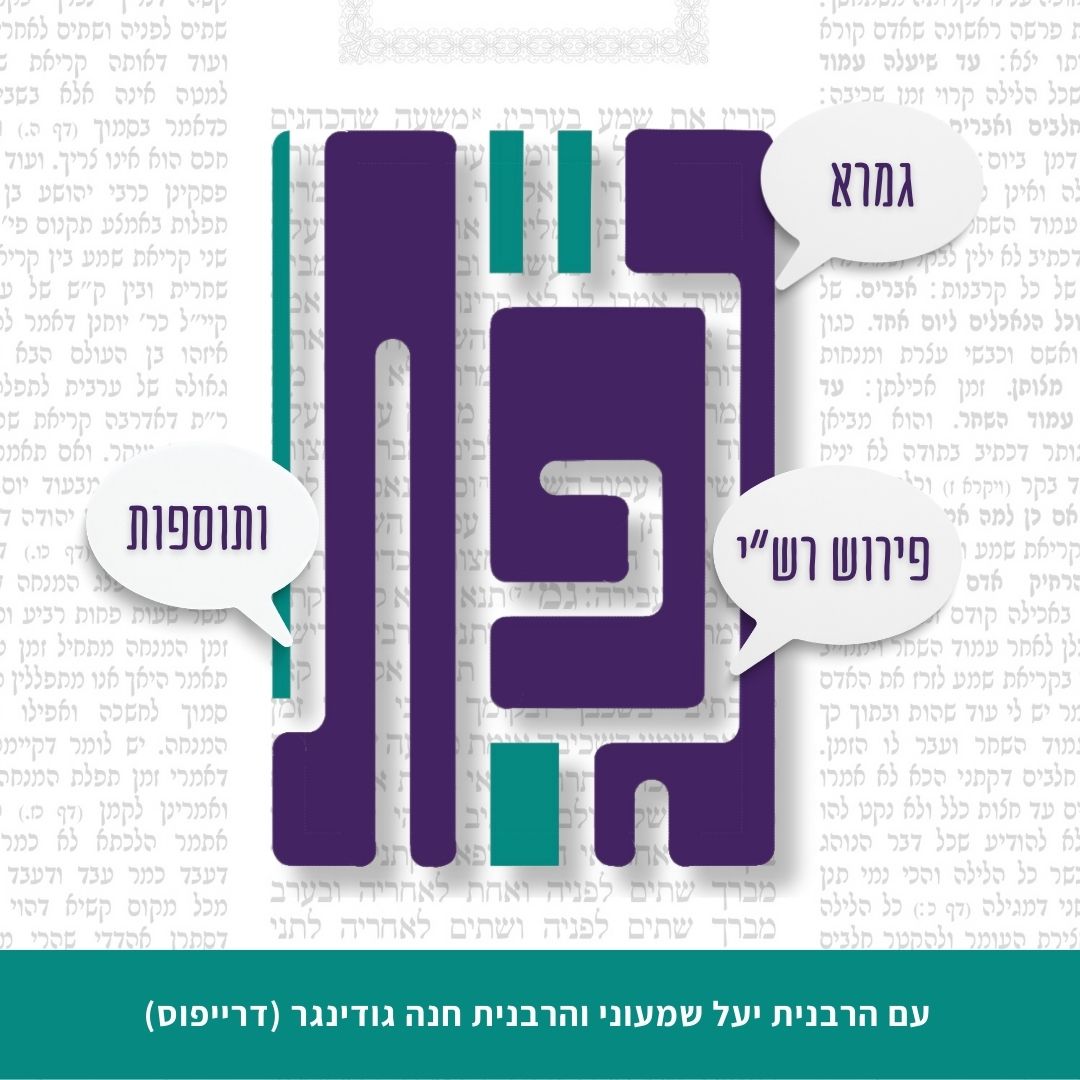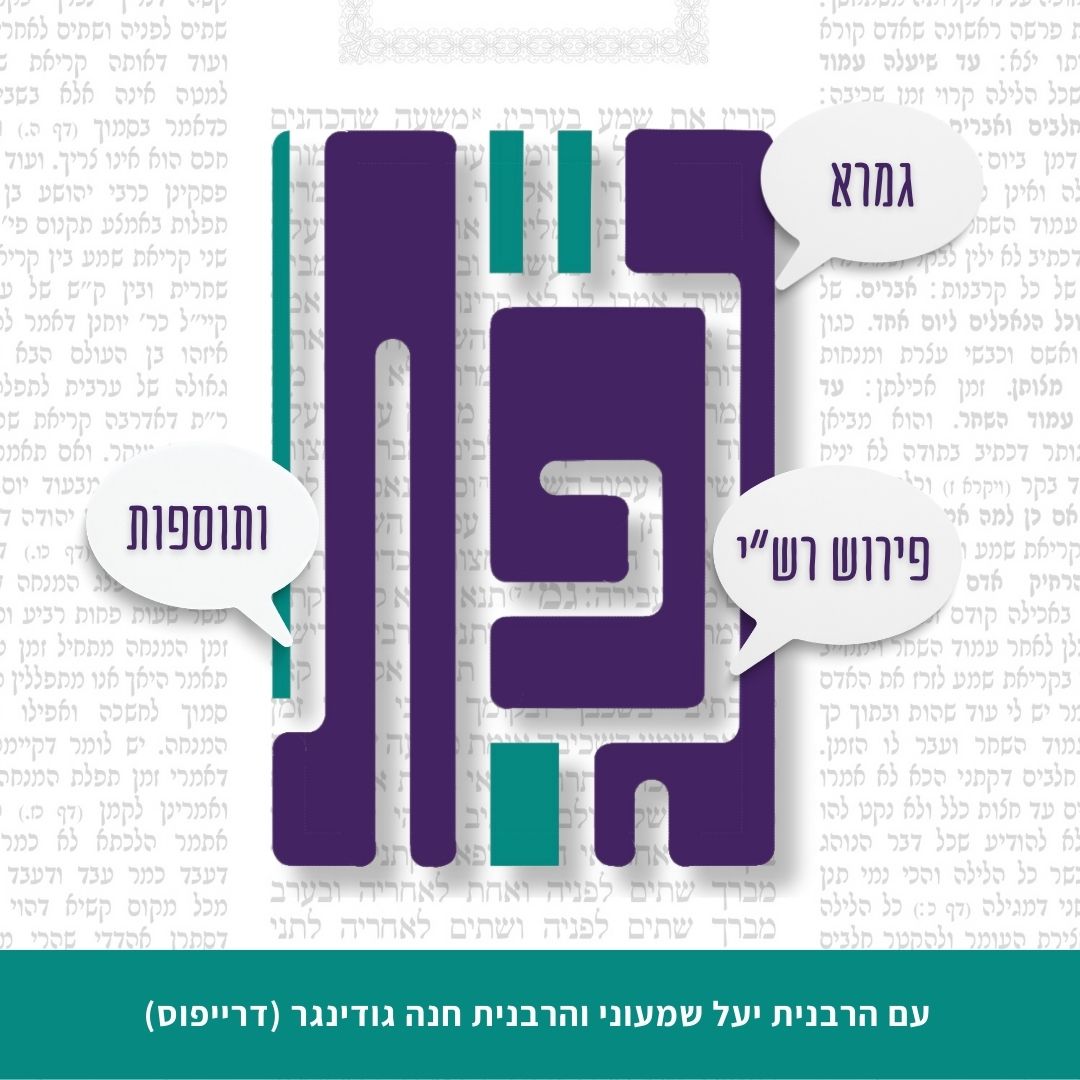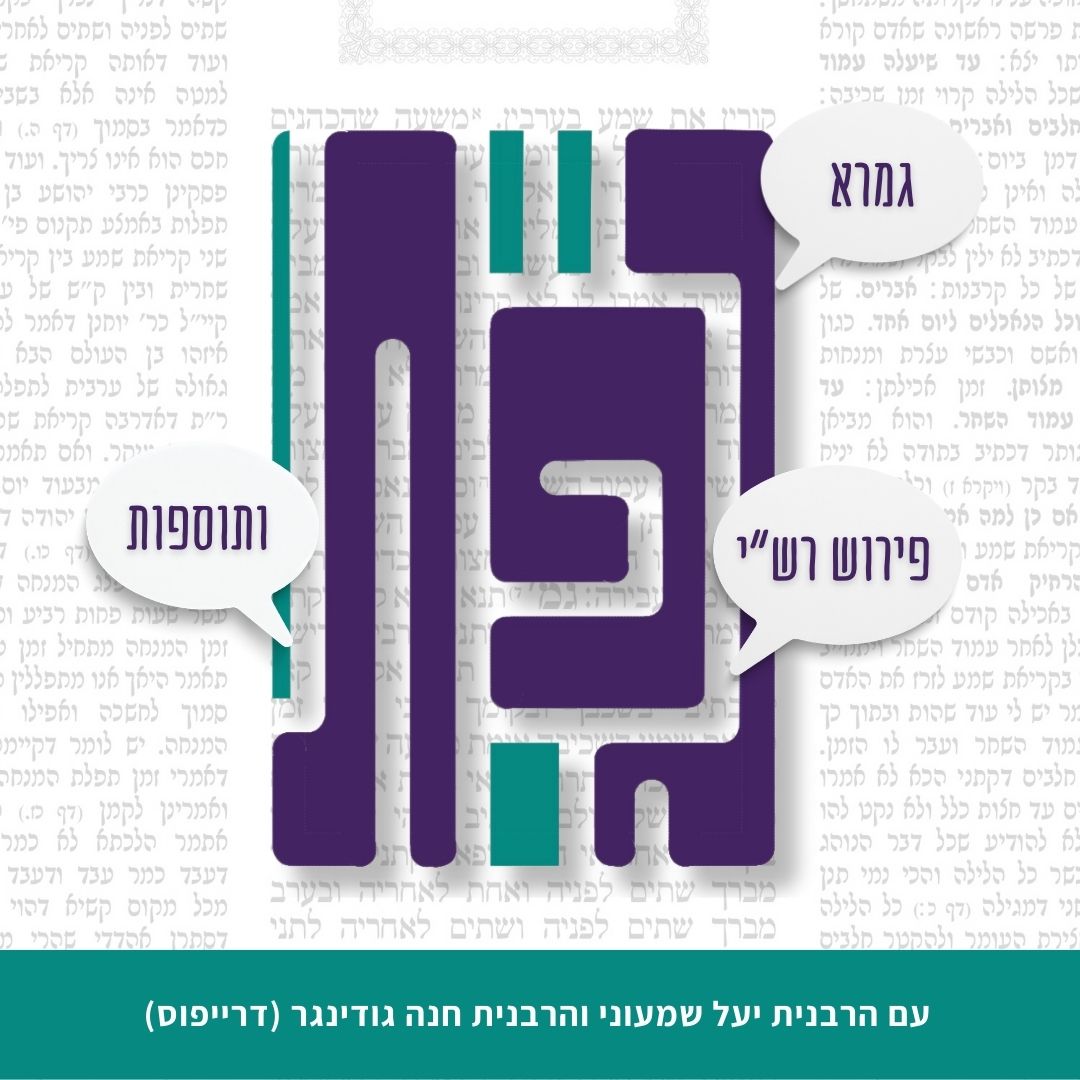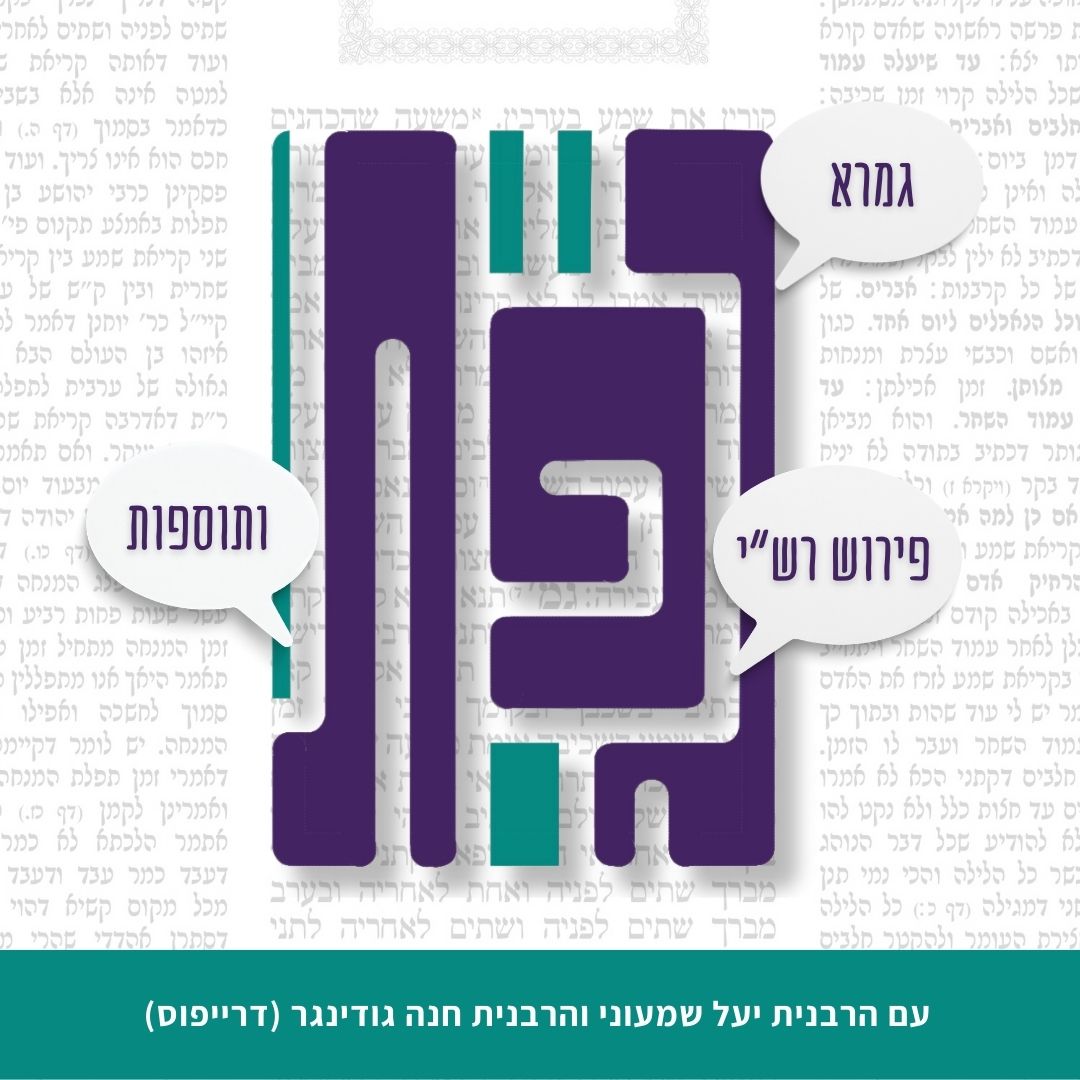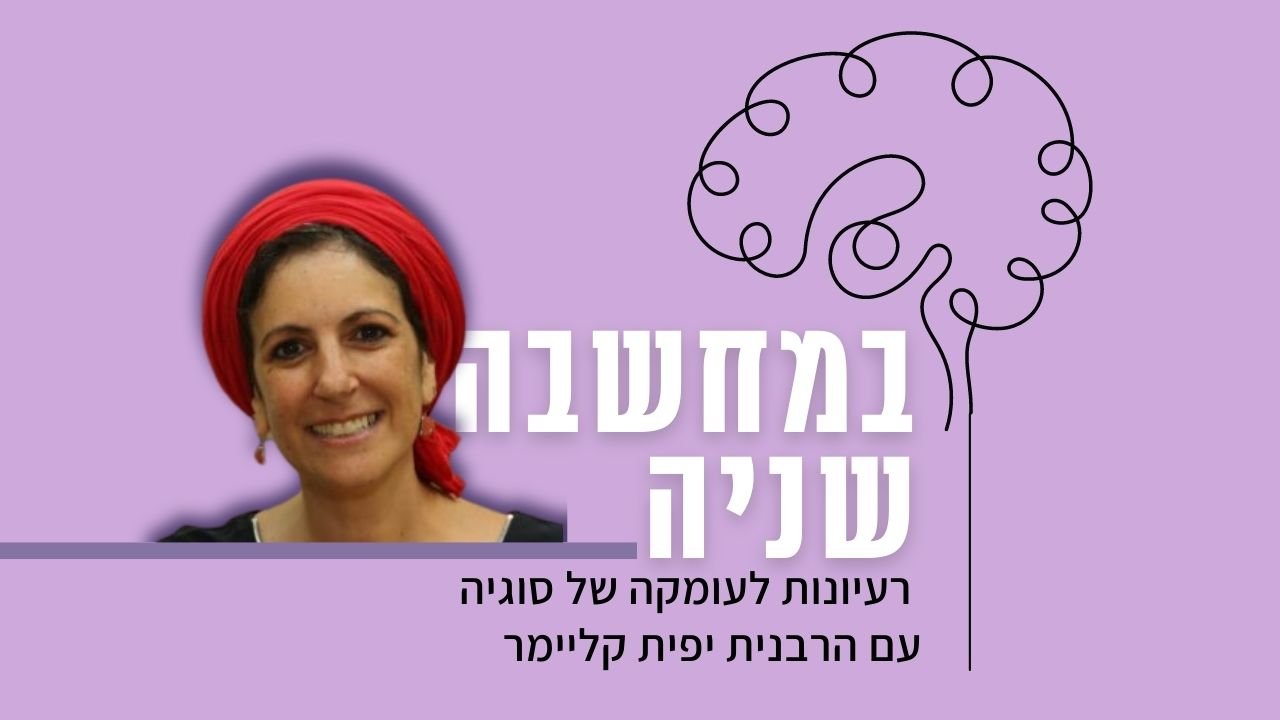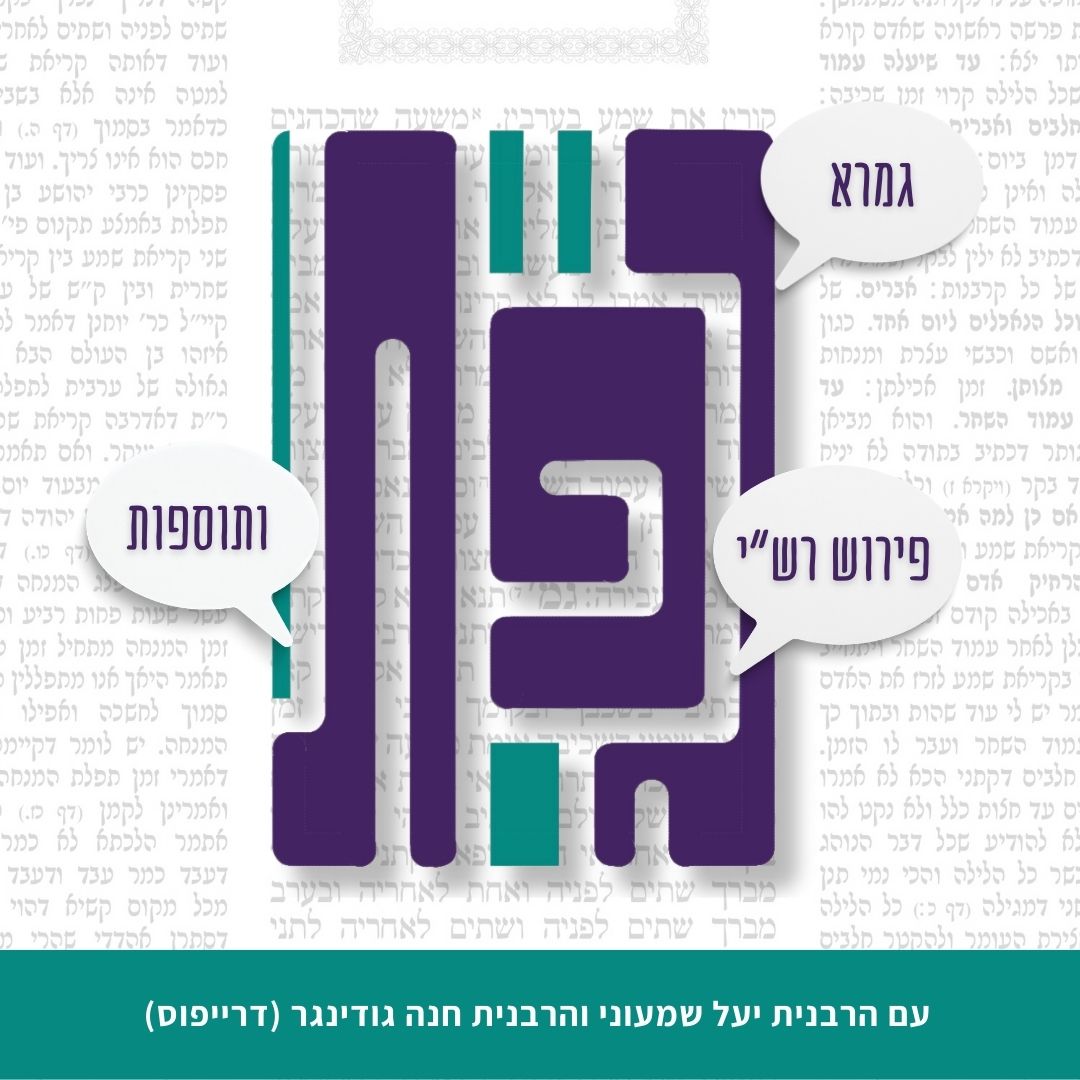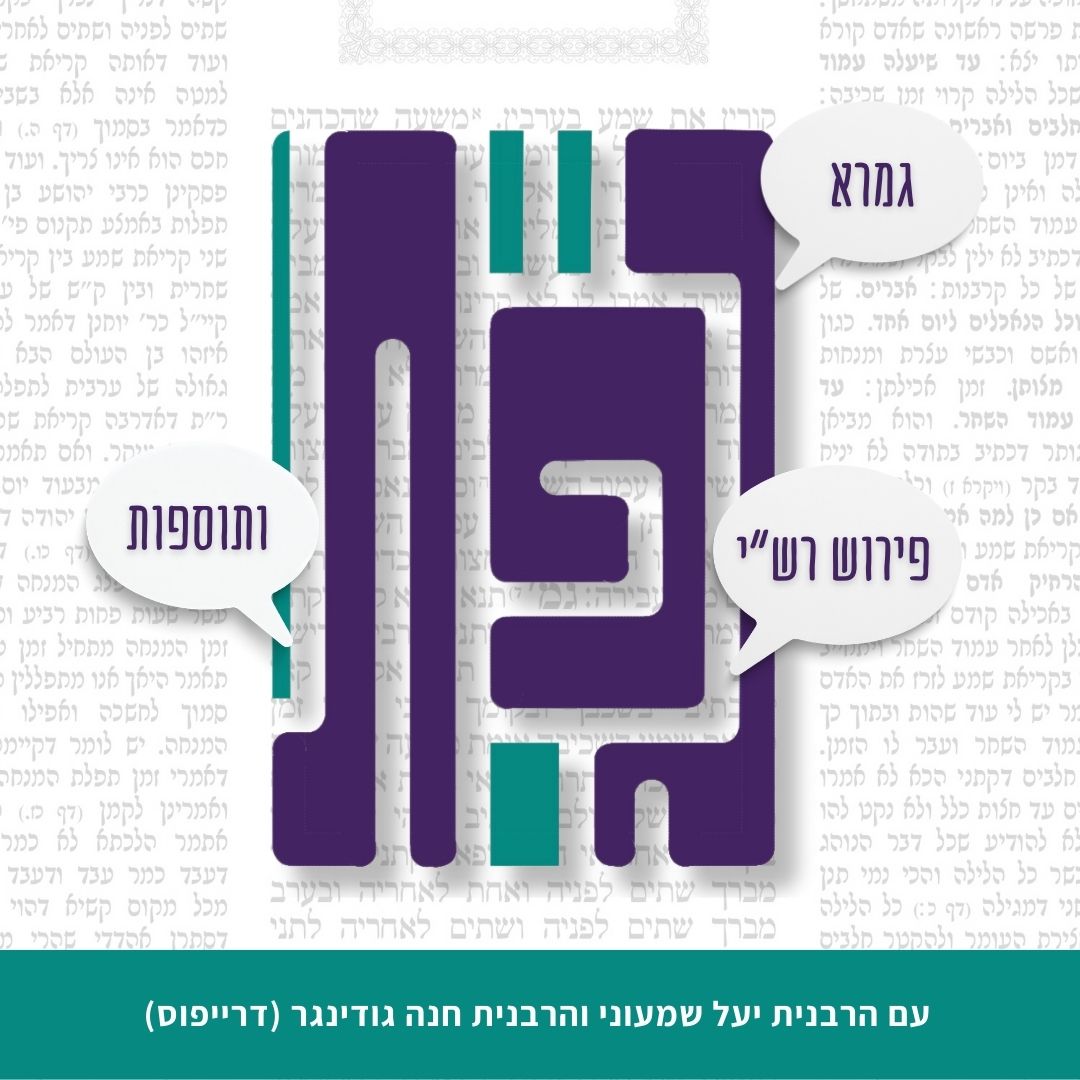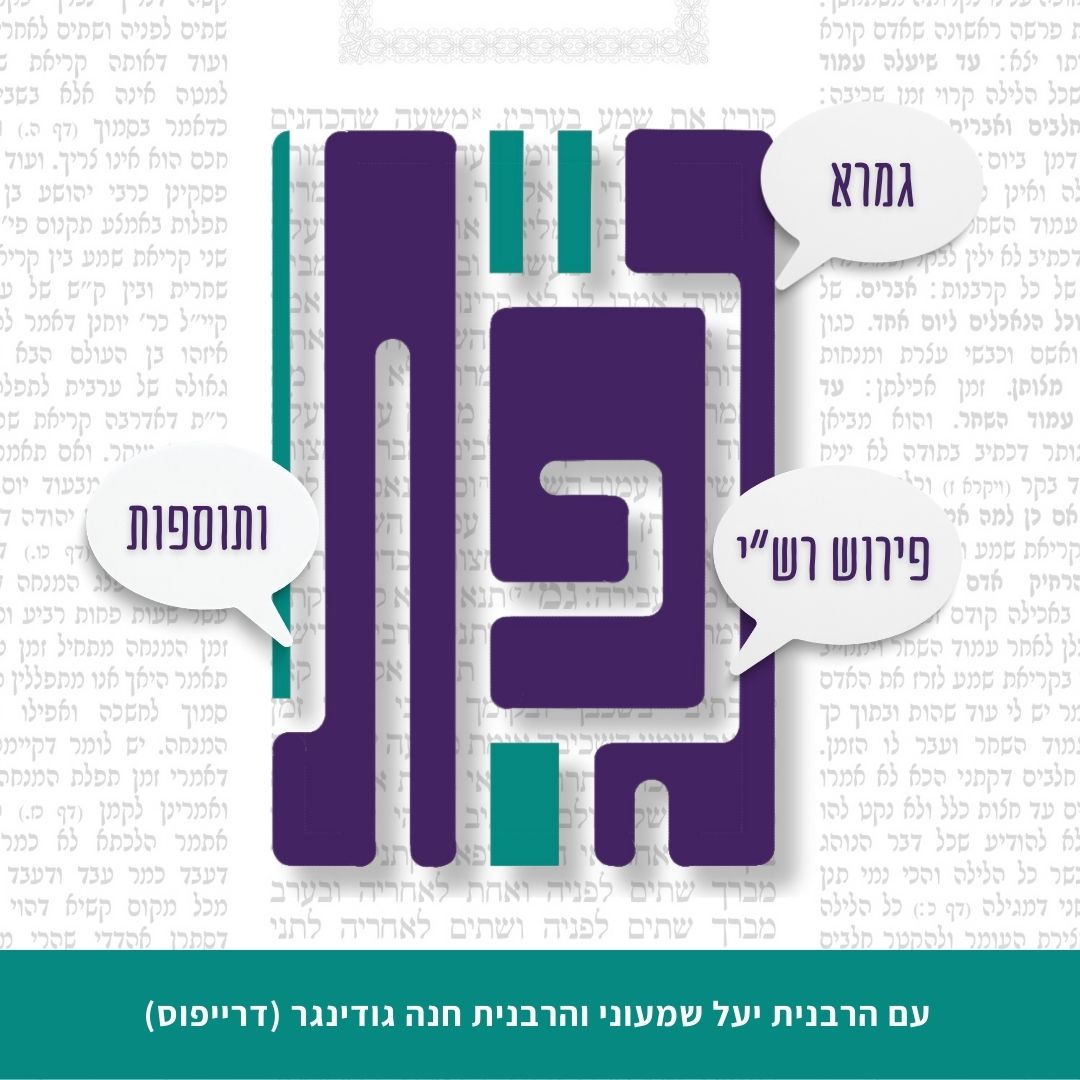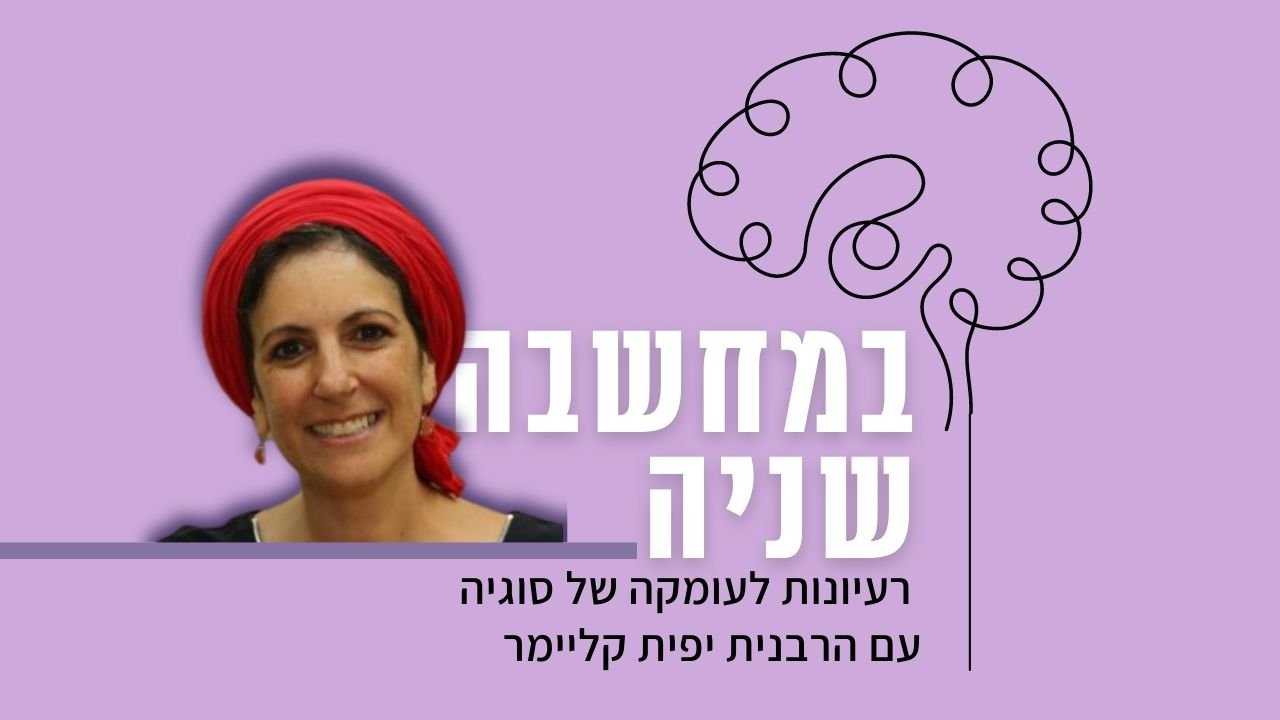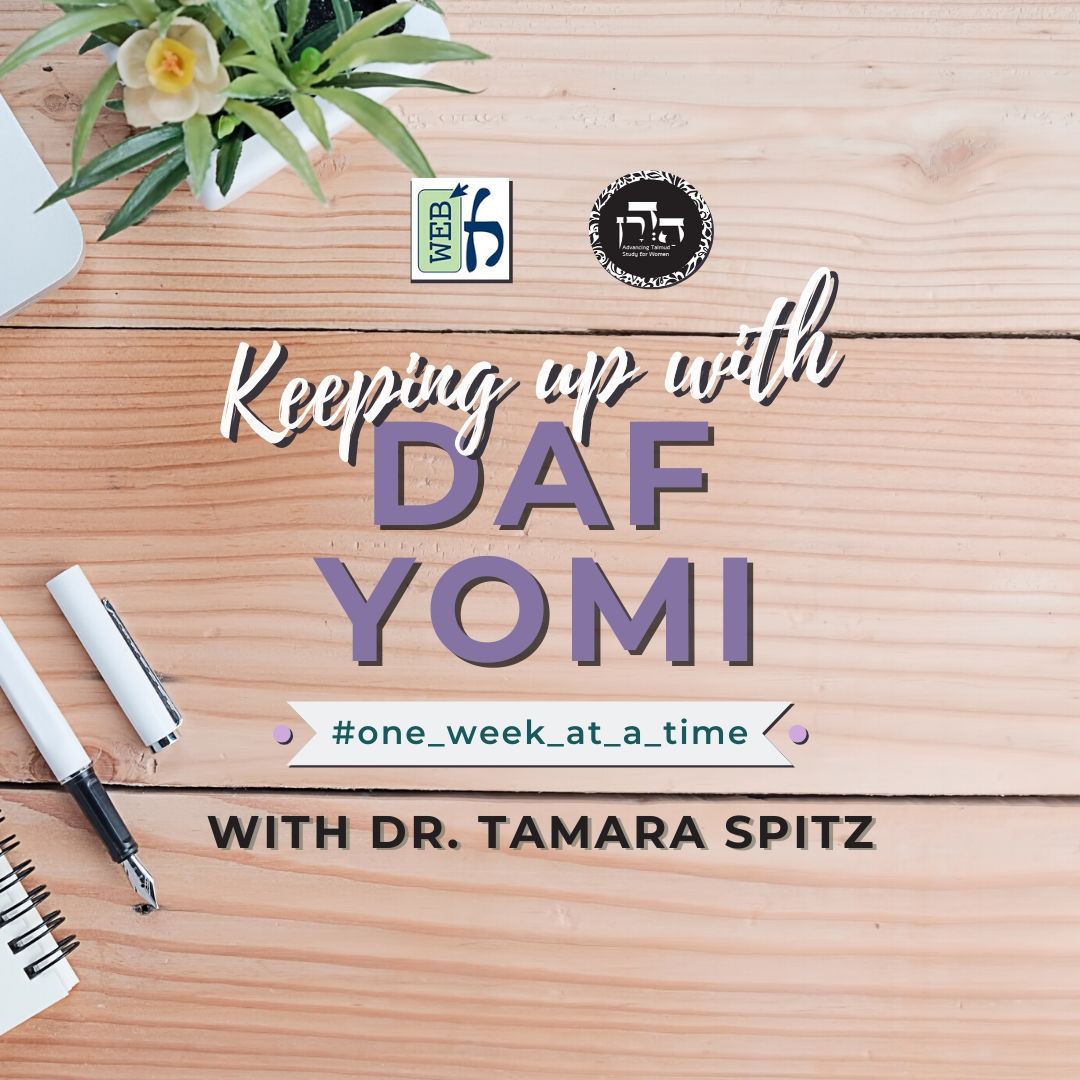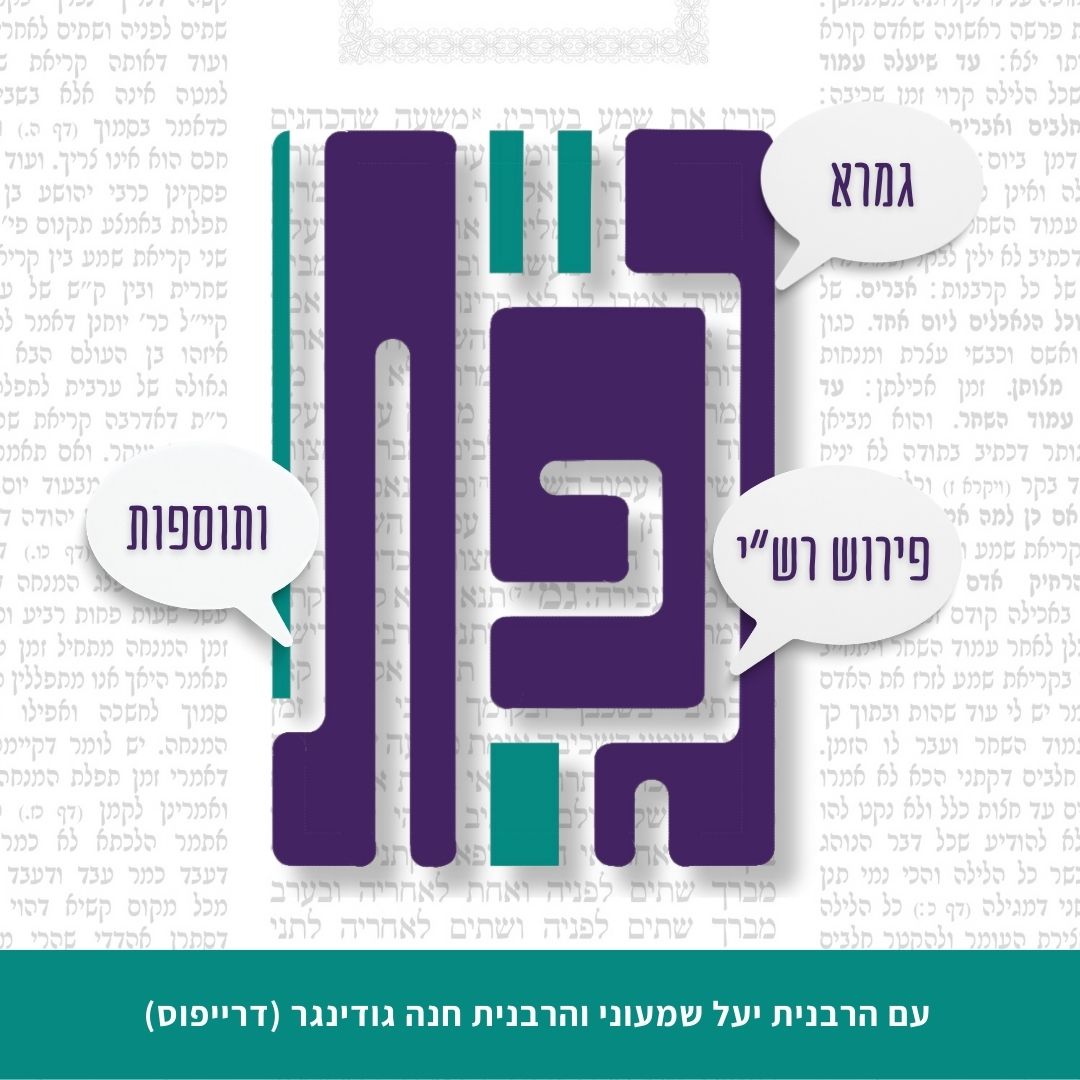למרות שיש קטגוריות שונות הפטורות מדיני אונאה, האם הם גם פטורים במקרה שבו מישהו הונה את חברו בשיעור גבוה יותר משישית (ביטול מקח)? רבי יונה ורבי ירמיה מציעים כל אחד תשובות שונות בשם רבי יוחנן. קושיה מועלית נגד דעתו של רבי ירמיה מעמדתו של רבי יוחנן במקום אחר. מובאות מספר תשובות אפשרויות. מאיפה דורשים שקטיגוריות אלו גם פטורים מדיני כפל ושמירה?
הלימוד השבוע מוקדש לזכות ולשלום הַיְימׇנוֹט אֱמוּנָה בַּת באנצ’י (קָסָאוּ) בת 11 שנעלמה במקום מגוריה בצפת, לפני שנתיים, ביום ט”ז אדר תשפ”ד (25.2.24), ולא נודעו עקבותיה.
הלימוד השבוע מוקדש למען ביטחון המדינה, החיילים והאזרחים, ולמען חירותו של העם האיראני. שנזכה בקרוב שיתקיים בנו הפסוק: "לַיְּהוּדִים הָיְתָה אוֹרָה וְשִׂמְחָה וְשָׂשֹׂן וִיקָר”.
הלימוד השבוע מוקדש לזכות וְלִשְׁלוֹם הָיימָנוֹט אֱמוּנָה בַּת באנצ’י (קָסָאוּ), בת 11 שנעלמה במקום מגוריה בצפת, לפני שנתיים, ביום ט”ז אדר תשפ״ד (25.2.24), ולא נודעו עקבותיה. אנו מתפללים שֶׁתִּמָּצֵא וְתוּשַׁב לביתה במהרה!
רוצה להקדיש שיעור?
כלים
הלימוד השבוע מוקדש לזכות ולשלום הַיְימׇנוֹט אֱמוּנָה בַּת באנצ’י (קָסָאוּ) בת 11 שנעלמה במקום מגוריה בצפת, לפני שנתיים, ביום ט”ז אדר תשפ”ד (25.2.24), ולא נודעו עקבותיה.
הלימוד השבוע מוקדש למען ביטחון המדינה, החיילים והאזרחים, ולמען חירותו של העם האיראני. שנזכה בקרוב שיתקיים בנו הפסוק: "לַיְּהוּדִים הָיְתָה אוֹרָה וְשִׂמְחָה וְשָׂשֹׂן וִיקָר”.
הלימוד השבוע מוקדש לזכות וְלִשְׁלוֹם הָיימָנוֹט אֱמוּנָה בַּת באנצ’י (קָסָאוּ), בת 11 שנעלמה במקום מגוריה בצפת, לפני שנתיים, ביום ט”ז אדר תשפ״ד (25.2.24), ולא נודעו עקבותיה. אנו מתפללים שֶׁתִּמָּצֵא וְתוּשַׁב לביתה במהרה!
כלים
העמקה
רוצה להבין מה באמת קורה מתחת לפני השטח של הסוגיה?
שיעורים, פודקאסטים והרחבות של מיטב המורות שלנו יפתחו לך עוד זוויות וכיווני חשיבה.
חדשה בלימוד הגמרא?
זה הדף הראשון שלך? איזו התרגשות עצומה! יש לנו בדיוק את התכנים והכלים שיעזרו לך לעשות את הצעדים הראשונים ללמידה בקצב וברמה שלך, כך תוכלי להרגיש בנוח גם בתוך הסוגיות המורכבות ומאתגרות.
פסיפס הלומדות שלנו
גלי את קהילת הלומדות שלנו, מגוון נשים, רקעים וסיפורים. כולן חלק מתנועה ומסע מרגש ועוצמתי.
בבא מציעא נז
מַהוּ לְמִינְקַט וּמֵיכַל מִינַּיְיהוּ: כְּמַאן דְּשַׁדְיָין בְּכַדָּא דָּמֵי, וּשְׁרִינְהוּ עוֹמֶר, אוֹ דִלְמָא בַּטְּלִינְהוּ אַגַּב אַרְעָא? תֵּיקוּ.
This is Rava’s dilemma: What is the halakha? Is it permitted for one to take some of the kernels and eat from them? Is their legal status like that of kernels cast into a jug, and the sacrifice of the omer offering rendered their consumption permitted? Or perhaps he subordinated them to the ground, and their legal status is that of seeds that did not take root, and they are therefore forbidden. The Gemara concludes: The dilemmas shall stand unresolved.
אָמַר רָבָא: אָמַר רַב חַסָּא, בָּעֵי רַבִּי אַמֵּי: אוֹנָאָה אֵין לָהֶם, בִּיטּוּל מִקָּח יֵשׁ לָהֶם אוֹ אֵין לָהֶן? אָמַר רַב נַחְמָן: הֲדַר אָמַר רַב חַסָּא, פָּשֵׁיט רַבִּי אַמֵּי: אוֹנָאָה אֵין לָהֶם, בִּיטּוּל מִקָּח יֵשׁ לָהֶם. רַבִּי יוֹנָה אָמַר אַהֶקְדֵּשׁוֹת, רַבִּי יִרְמְיָה אָמַר אַקַּרְקָעוֹת, וְתַרְוַיְיהוּ מִשְּׁמֵיהּ דְּרַבִּי יוֹחָנָן אָמְרוּ: אוֹנָאָה אֵין לָהֶם, בִּיטּוּל מִקָּח יֵשׁ לָהֶן.
§ Rava said that Rav Ḥasa said that Rabbi Ami raises a dilemma with regard to those matters that are not subject to the halakhot of exploitation: Is the halakha that they are not subject to exploitation where the disparity in the price is one-sixth, but they are subject to nullification of the transaction when it is greater than that? Or, perhaps they are not subject to nullification of the transaction either. Rav Naḥman said: Rav Ḥasa then said that Rabbi Ami resolved this dilemma and said: They are not subject to exploitation; they are subject to nullification of the transaction. Rabbi Yona said: This ruling applies to consecrated property. Rabbi Yirmeya said: It applies to land. And both of them said it in the name of Rabbi Yoḥanan: They are not subject to exploitation; they are subject to nullification of the transaction.
מַאן דְּאָמַר אַהֶקְדֵּשׁוֹת, כׇּל שֶׁכֵּן אַקַּרְקָעוֹת. מַאן דְּאָמַר אַקַּרְקָעוֹת, אֲבָל אַהֶקְדֵּשׁוֹת לָא. כְּדִשְׁמוּאֵל, דְּאָמַר שְׁמוּאֵל: הֶקְדֵּשׁ שָׁוֶה מָנֶה שֶׁחִילְּלוֹ עַל שָׁוֶה פְּרוּטָה – מְחוּלָּל.
The Gemara comments: The one who states that this ruling applies to consecrated property, all the more so does it apply to land. The one who states that this ruling applies to land states it only with regard to land, but it does not apply to consecrated property, in accordance with the opinion of Shmuel, as Shmuel says: Consecrated property worth one hundred dinars that one desacralized upon a coin worth one peruta, is desacralized. Since consecrated property is not subject to the halakhot of exploitation at all, it is desacralized upon coins worth any sum.
תְּנַן הָתָם: אִם הָיָה קוֹדֶשׁ בַּעַל מוּם, יָצָא לְחוּלִּין, וְצָרִיךְ לַעֲשׂוֹת לוֹ דָּמִים. אָמַר רַבִּי יוֹחָנָן: יָצָא לְחוּלִּין – דְּבַר תּוֹרָה, וְצָרִיךְ לַעֲשׂוֹת לוֹ דָּמִים – מִדִּבְרֵיהֶם. וְרֵישׁ לָקִישׁ אָמַר: אַף צָרִיךְ לַעֲשׂוֹת לוֹ דָּמִים מִן הַתּוֹרָה.
We learned in a mishna there (Temura 26b): If the consecrated animal was blemished and another was substituted for it, the blemished animal leaves its consecrated state and assumes non-sacred status, and one is required to calculate the difference in monetary value between the two animals and pay it to the Temple treasury. Rabbi Yoḥanan says: It leaves its consecrated state and assumes non-sacred status by Torah law, and one is required to calculate the difference in monetary value and pay it to the Temple treasury by rabbinic law. And Reish Lakish says: Even the halakha that one is required to calculate the difference in monetary value and pay it to the Temple treasury is by Torah law.
בְּמַאי עָסְקִינַן? אִילֵימָא בִּכְדֵי אוֹנָאָה, בְּהָא לֵימָא רֵישׁ לָקִישׁ: צָרִיךְ לַעֲשׂוֹת לוֹ דָּמִים דְּבַר תּוֹרָה? וְהָתְנַן: אֵלּוּ דְּבָרִים שֶׁאֵין לָהֶם אוֹנָאָה: הַקַּרְקָעוֹת, וְהָעֲבָדִים, וְהַשְּׁטָרוֹת, וְהַהֶקְדֵּשׁוֹת!
The Gemara asks: With what are we dealing? If we say that the difference between the value of the substitute animal and the value of the consecrated animal was the measure of exploitation, does Reish Lakish say in that case: He is required to calculate the difference in monetary value and pay it to the Temple treasury by Torah law? But didn’t we learn in the mishna: These are matters that are not subject to the halakhot of exploitation: Land, slaves, documents, and consecrated property?
אֶלָּא בִּיטּוּל מִקָּח, בְּהָא לֵימָא רַבִּי יוֹחָנָן צָרִיךְ לַעֲשׂוֹת לוֹ דָּמִים מִדִּבְרֵיהֶם? וְהָאָמַר רַבִּי יוֹנָה אַהֶקְדֵּשׁוֹת, וְרַבִּי יִרְמְיָה אָמַר אַקַּרְקָעוֹת, וְתַרְוַיְיהוּ מִשְּׁמֵיהּ דְּרַבִּי יוֹחָנָן אָמְרִי: אוֹנָאָה אֵין לָהֶם, בִּיטּוּל מִקָּח יֵשׁ לָהֶם! לְעוֹלָם בְּבִיטּוּל מִקָּח, וְאֵיפוֹךְ דְּרַבִּי יוֹחָנָן – לְרֵישׁ לָקִישׁ, וּדְרֵישׁ לָקִישׁ – לְרַבִּי יוֹחָנָן.
Rather, the difference was the measure of nullification of the transaction. In that case, would Rabbi Yoḥanan say: He is required to calculate the difference in monetary value and pay it to the Temple treasury by rabbinic law? But didn’t Rabbi Yona say that this ruling applies to consecrated property, and didn’t Rabbi Yirmeya say it applies to land, and both of them say in the name of Rabbi Yoḥanan: They are not subject to exploitation; they are subject to nullification of the transaction? The Gemara answers: Actually, the difference was the measure of nullification of the transaction. And reverse attribution of the opinions, so that the opinion of Rabbi Yoḥanan will be attributed to Reish Lakish, and the opinion of Reish Lakish will be attributed to Rabbi Yoḥanan.
בְּמַאי קָמִיפַּלְגִי? בְּדִשְׁמוּאֵל, דְּאָמַר שְׁמוּאֵל: הֶקְדֵּשׁ שָׁוֶה מָנֶה שֶׁחִילְּלוֹ עַל שָׁוֶה פְּרוּטָה – מְחוּלָּל. מָר אִית לֵיהּ דִּשְׁמוּאֵל, וּמָר לֵית לֵיהּ דִּשְׁמוּאֵל.
The Gemara asks: With regard to what do Reish Lakish and Rabbi Yoḥanan disagree? They disagree with regard to the halakha of Shmuel, as Shmuel says: Consecrated property worth one hundred dinars that one desacralized upon a coin worth one peruta is desacralized. One Sage, Reish Lakish, accepts the opinion of Shmuel, and therefore the consecrated article is desacralized by Torah law and the requirement to calculate and pay the difference is by rabbinic law. And one Sage, Rabbi Yoḥanan, does not accept the opinion of Shmuel, and he therefore holds that the requirement to calculate and pay the difference is by Torah law.
אִיבָּעֵית אֵימָא, דְּכוּלֵּי עָלְמָא אִית לְהוּ דִּשְׁמוּאֵל, וְהָכָא בְּהָא קָמִיפַּלְגִי: מָר סָבַר שֶׁחִילְּלוֹ – אִין, לְכַתְּחִילָּה – לָא. וּמָר סָבַר: אֲפִילּוּ לְכַתְּחִלָּה.
If you wish, say instead that everyone accepts the opinion of Shmuel, and here they disagree about this: One Sage, Rabbi Yoḥanan, holds that yes, consecrated property worth one hundred dinars that one desacralized upon a coin worth one peruta is desacralized after the fact, but ab initio, no, one may not do so. Therefore, one must nevertheless pay the difference to the Temple treasury by Torah law. And one Sage, Reish Lakish, holds that the opinion of Shmuel applies even ab initio. Therefore, the requirement to pay the difference to the Temple treasury is by rabbinic law.
אִיבָּעֵית אֵימָא: לְעוֹלָם בִּכְדֵי אוֹנָאָה, וְלָא תֵּיפוֹךְ, וּבִדְרַב חִסְדָּא קָמִיפַּלְגִי, דְּאָמַר: מַאי אֵין לָהֶם אוֹנָאָה? אֵינָן בְּתוֹרַת אוֹנָאָה,
If you wish, say instead: Actually, the difference between the actual value of the animal and the amount used to desacralize it was within the measure of exploitation, and do not reverse attribution of the opinions of Reish Lakish and Rabbi Yoḥanan. And they disagree with regard to the opinion of Rav Ḥisda, who said: What is the meaning of: They are not subject to the halakhot of exploitation? It means that they are not subject to the principle of exploitation at all. Rather, a more stringent standard applies,
דַּאֲפִילּוּ פָּחוֹת מִכְּדֵי אוֹנָאָה חוֹזֵר.
in that even if the difference in price is less than the measure of exploitation, the exploited party may renege on the transaction. Rabbi Yoḥanan does not accept the opinion of Rav Ḥisda and Reish Lakish does.
מֵיתִיבִי: רִבִּית וְאוֹנָאָה לַהֶדְיוֹט, וְאֵין רִבִּית וְאוֹנָאָה לַהֶקְדֵּשׁ! מִי אַלִּימָא מִמַּתְנִיתִין דְּאוֹקֵימְנָא בְּתוֹרַת אוֹנָאָה? הָכִי נָמֵי: רִבִּית וְדִין אוֹנָאָה לַהֶדְיוֹט, וְאֵין רִבִּית וְדִין אוֹנָאָה לַהֶקְדֵּשׁ.
The Gemara raises an objection to Rav Ḥisda’s opinion from a baraita: Dealings with a layman are subject to the halakhot of interest and exploitation, but dealings with consecrated property are not subject to the halakhot of interest and exploitation. The Gemara answers: Is the objection from the baraita stronger than that from the mishna, which was defused when we established it to be referring to the principle of exploitation, i.e., that the principle that up to one-sixth is not considered exploitation does not apply to consecrated property? So too the baraita should be understood: The halakhot of interest and the principle of exploitation apply to dealings with a layman, but the halakhot of interest and the principle of exploitation do not apply to dealings involving consecrated property.
אִי הָכִי, הַיְינוּ דְּקָתָנֵי סֵיפָא: זֶה חוֹמֶר בַּהֶדְיוֹט מִבַּהֶקְדֵּשׁ? אַרִבִּית! לִיתְנֵי נָמֵי: זֶה חוֹמֶר בַּהֶקְדֵּשׁ מִבַּהֶדְיוֹט, אַאוֹנָאָה!
The Gemara raises a difficulty: If so, is that consistent with that which is taught in the latter clause of that baraita: This is the stringency with regard to the layman, in contrast to the halakha with regard to consecrated property? According to this explanation, the halakha with regard to consecrated property is more stringent than the halakha with regard to a layman. The Gemara answers: This stringency is only in the case of interest, as it is permitted to collect interest from consecrated property. The Gemara asks: If so, let the tanna also teach: This is the stringency with regard to consecrated property, in contrast to the halakha with regard to the layman in the case of exploitation.
הָכִי הַשְׁתָּא? בִּשְׁלָמָא, זֶה חוֹמֶר בַּהֶדְיוֹט מִבַּהֶקְדֵּשׁ, וְתוּ לָא. אֶלָּא הֶקְדֵּשׁ, זֶה חוֹמֶר וְתוּ לָא?
The Gemara rejects this question: How can these cases be compared? Granted, the mishna states: This is the stringency with regard to the layman, in contrast to the halakha with regard to consecrated property, and nothing further, i.e., there are no other cases where the halakha is more stringent for the layman than it is for consecrated property. But with regard to consecrated property, can one say: This is the stringency, and nothing further, there are no other stringencies? There are many halakhot in which consecrated property is treated more stringently than non-sacred property.
רִבִּית דְּהֶקְדֵּשׁ הֵיכִי דָמֵי? אִילֵּימָא דְּאוֹזְפֵיהּ גִּזְבָּר מֵאָה בְּמֵאָה וְעֶשְׂרִים – וַהֲלֹא מָעַל הַגִּזְבָּר, וְכֵיוָן שֶׁמָּעַל הַגִּזְבָּר, יָצְאוּ מְעוֹתָיו לְחוּלִּין, וְהָווּ לְהוּ דְּהֶדְיוֹט!
§ The Gemara asks: What are the circumstances of interest in cases of consecrated property? If we say that the Temple treasurer lent one hundred consecrated dinars in exchange for repayment of one hundred and twenty dinars, didn’t the treasurer thereby misuse consecrated property? And once the treasurer misused the money by giving it to a layman, his money immediately leaves its consecrated state and assumes non-sacred status. And it is then money of a layman, and the halakhot of interest apply to it.
אָמַר רַב הוֹשַׁעְיָא: הָכָא בְּמַאי עָסְקִינַן? כְּגוֹן שֶׁקִּיבֵּל עָלָיו לְסַפֵּק סְלָתוֹת מֵאַרְבַּע, וְעָמְדוּ מִשָּׁלֹשׁ. כִּדְתַנְיָא: הַמְקַבֵּל עָלָיו לְסַפֵּק סְלָתוֹת מֵאַרְבַּע וְעָמְדוּ מִשָּׁלֹשׁ – מְסַפֵּק מֵאַרְבַּע; מִשָּׁלֹשׁ וְעָמְדוּ מֵאַרְבַּע – מְסַפֵּק מֵאַרְבַּע, שֶׁיַּד הֶקְדֵּשׁ עַל הָעֶלְיוֹנָה.
Rav Hoshaya said: With what are we dealing here? We are dealing with a case where one accepts upon himself to supply fine flour to the Temple at the price of four se’a for a sela, and the market price rose and stood at three se’a for a sela, as it is taught in a baraita: In the case of one who accepts upon himself to supply fine flour at four se’a for a sela, and their market price stood at three se’a for a sela, he is required to fulfill his commitment and supply fine flour at four se’a for a sela. If one committed to supply fine flour at three se’a for a sela, and their market price decreased until it stood at four se’a for a sela, he must supply fine flour at four se’a for a sela. This is a form of interest, as the result is that the Temple treasury is at an advantage. Although an arrangement of that kind is prohibited in transactions involving laymen, in dealings of the Temple treasury it is permitted.
רַב פָּפָּא אָמַר: הָכָא בְּאַבְנֵי בִנְיָן הַמְּסוּרוֹת לְגִזְבָּר עָסְקִינַן, כְּדִשְׁמוּאֵל, דְּאָמַר שְׁמוּאֵל: בּוֹנִין בַּחוֹל, וְאַחַר כָּךְ מַקְדִּישִׁין.
Rav Pappa said that there is a less complicated case of interest involving consecrated property: Here we are dealing with building stones that are entrusted to the Temple treasurer, in accordance with the opinion of Shmuel, as Shmuel says: One builds the structures in the Temple with non-sacred materials to avoid misuse of consecrated property during construction, and one consecrates those materials thereafter. The treasurer has provisional possession of property that will ultimately belong to the Temple treasury. The stones are non-sacred and can be loaned to others, but nevertheless they are not subject to the halakhot of interest.
אֵין בָּהֶן תַּשְׁלוּמֵי כֶפֶל וְכוּ׳. מְנָהָנֵי מִילֵּי? דְּתָנוּ רַבָּנַן: ״עַל כׇּל דְּבַר פֶּשַׁע״ – כְּלָל, ״עַל שׁוֹר עַל חֲמוֹר עַל שֶׂה עַל שַׂלְמָה״ – פְּרָט, ״עַל כׇּל אֲבֵדָה אֲשֶׁר יֹאמַר״ – חָזַר וְכָלַל.
§ The mishna teaches: Slaves, documents, land, and consecrated property are not subject to the halakhot of payment of double the principal. The Gemara asks: From where are these matters derived? It is as the Sages taught in a baraita with regard to the verse that discusses double payment: “For any matter of trespass, whether it be for an ox, for a donkey, for a sheep, for a garment, or for any manner of lost thing about which one shall say: This is it, the claims of both of them shall come before the judges, the one whom the judges convict shall pay double to the other” (Exodus 22:8). “For any matter of trespass” is a generalization; “whether it be for an ox, for a donkey, for a sheep, for a garment” is a detail. And when the verse states: “Or for any manner of lost thing,” it then generalizes again.
כְּלָל וּפְרָט וּכְלָל, אִי אַתָּה דָן אֶלָּא כְּעֵין הַפְּרָט; מָה הַפְּרָט מְפוֹרָשׁ – דָּבָר הַמִּטַּלְטֵל וְגוּפוֹ מָמוֹן, אַף כׇּל דָּבָר הַמִּטַּלְטֵל וְגוּפוֹ מָמוֹן.
Consequently, this verse contains a generalization, and a detail, and a generalization, and one of the thirteen rules of exegesis states that in such a case you may deduce that the verse is referring only to items similar to the detail. Therefore, just as each of the items mentioned in the detail is clearly defined as an item that is movable property and has intrinsic monetary value, so too double payment is practiced with regard to any item that is movable property and has intrinsic monetary value.
יָצְאוּ קַרְקָעוֹת, שֶׁאֵינָן מִטַּלְטְלִין. יָצְאוּ עֲבָדִים, שֶׁהוּקְּשׁוּ לְקַרְקָעוֹת. יָצְאוּ שְׁטָרוֹת, שֶׁאַף עַל פִּי שֶׁמִּטַּלְטְלִין, אֵין גּוּפָן מָמוֹן. הֶקְדֵּשׁוֹת – אָמַר קְרָא: ״רֵעֵהוּ״ – רֵעֵהוּ וְלֹא הֶקְדֵּשׁ.
Land is excluded, as it is not movable property. Canaanite slaves are excluded, as they are compared to land in many areas of halakha. Financial documents are excluded, as, although they are movable property, they do not have intrinsic monetary value. The value of the material on which the document is written is negligible; documents are valuable only because they serve as proof for monetary claims. Finally, consecrated property is excluded because it is written in the verse that the one found liable shall pay double to the other, i.e., to another person, but not to the Temple treasury.
וְלֹא תַּשְׁלוּמֵי אַרְבָּעָה וַחֲמִשָּׁה וְכוּ׳. מַאי טַעְמָא? תַּשְׁלוּמֵי אַרְבָּעָה וַחֲמִשָּׁה אָמַר רַחֲמָנָא, וְלֹא תַּשְׁלוּמֵי שְׁלֹשָׁה וְאַרְבָּעָה.
The mishna teaches: Nor payment of four and five times the principal, as these payments to do not apply to consecrated animals. The Gemara asks: What is the reason for this exclusion? The Gemara explains: The Merciful One states a payment of four or five times the principal, but not payment of three and four times the principal. It has already been established that there is no double payment in the cases in the mishna. The fourfold or fivefold payment in the case of the slaughter or sale of a stolen sheep or cow comprises the principal, the double payment, and then an additional two or three times the principle, respectively. Consequently, once the double payment is subtracted, the total paid would be three or four times the principal, and the verse makes no allowance for such a payment.
שׁוֹמֵר חִנָּם אֵינוֹ נִשְׁבָּע וְכוּ׳. מְנָהָנֵי מִילֵּי? דְּתָנוּ רַבָּנַן: ״כִּי יִתֵּן אִישׁ אֶל רֵעֵהוּ״ – כְּלָל, ״כֶּסֶף אוֹ כֵּלִים״ – פְּרָט, ״וְגֻנַּב מִבֵּית הָאִישׁ״ – חָזַר וְכָלַל.
The mishna teaches: An unpaid bailee does not take an oath if these items were stolen or lost. The Gemara asks: From where are these matters derived? It is as the Sages taught in a baraita with regard to the verse that discusses an unpaid bailee: “When a man delivers to his neighbor money or vessels to safeguard, and it is stolen out of the man’s house; if the thief is found, he shall pay double. If the thief is not found, then the master of the house shall approach the judge” (Exodus 22:6–7). “When a man delivers to his neighbor” is a generalization; “money or vessels” is a detail. And when the verse states: “And it is stolen out of the man’s house,” it then generalizes again.
כְּלָל וּפְרָט וּכְלָל, אִי אַתָּה דָן אֶלָּא כְּעֵין הַפְּרָט: מָה הַפְּרָט מְפוֹרָשׁ – דָּבָר הַמִּטַּלְטֵל וְגוּפוֹ מָמוֹן, אַף כׇּל דָּבָר הַמִּטַּלְטֵל וְגוּפוֹ מָמוֹן.
Consequently, this verse contains a generalization, and a detail, and a generalization, and one of the thirteen rules of exegesis states that in such a case you may deduce that the verse is referring only to items similar to the detail. Therefore, just as each of the items mentioned in the detail is clearly defined as an item that is movable property and has intrinsic monetary value, so too double payment is practiced with regard to any item that is movable property and has intrinsic monetary value.
יָצְאוּ קַרְקָעוֹת, שֶׁאֵינָן מִטַּלְטְלִין. יָצְאוּ עֲבָדִים, שֶׁהוּקְּשׁוּ לְקַרְקָעוֹת. יָצְאוּ שְׁטָרוֹת, שֶׁאַף עַל פִּי שֶׁמִּטַּלְטְלִין, אֵין גּוּפָן מָמוֹן. הֶקְדֵּשׁוֹת – אָמַר קְרָא: ״רֵעֵהוּ״ – רֵעֵהוּ, וְלֹא שֶׁל הֶקְדֵּשׁ.
Land is excluded, as it is not movable property. Canaanite slaves are excluded, as they are compared to land in many areas of halakha. Financial documents are excluded, as, although they are movable property, they do not have intrinsic monetary value. The value of the material on which the document is written is negligible; documents are valuable only because they serve as proof for monetary claims. Finally, consecrated property is excluded because it is written in the verse that the one found liable shall pay double to the other, i.e., to another person, but not to the Temple treasury.
נוֹשֵׂא שָׂכָר אֵינוֹ מְשַׁלֵּם וְכוּ׳. מְנָהָנֵי מִילֵּי? דְּתָנוּ רַבָּנַן: ״כִּי יִתֵּן אִישׁ אֶל רֵעֵהוּ״ – כְּלָל, ״חֲמוֹר אוֹ שׁוֹר אוֹ שֶׂה״ – פָּרַט, ״וְכׇל בְּהֵמָה לִשְׁמוֹר״ – חָזַר וְכָלַל.
The mishna continues: A paid bailee does not pay if these items were stolen or lost. The Gemara asks: From where are these matters derived? The Gemara answers: It is as the Sages taught in a baraita with regard to the verse that discusses a paid bailee: “When a man delivers to his neighbor a donkey, or an ox, or a sheep, or any beast to safeguard, and it dies, or is hurt, or is driven away, no man seeing it, the oath of the Lord shall be between them both…but if it be stolen from him, he shall make restitution to its owner” (Exodus 22:9–11). “When a man delivers to his neighbor” is a generalization; “a donkey, or an ox, or a sheep” is a detail. And when the verse states: “Or any beast to safeguard,” it then generalizes again.
כְּלָל וּפְרָט וּכְלָל, אִי אַתָּה דָן אֶלָּא כְּעֵין הַפְּרָט: מָה הַפְּרָט מְפוֹרָשׁ – דָּבָר הַמִּטַּלְטֵל וְגוּפוֹ מָמוֹן, אַף כׇּל דָּבָר הַמִּטַּלְטֵל וְגוּפוֹ מָמוֹן.
Consequently, this verse contains a generalization, and a detail, and a generalization, and one of the thirteen rules of exegesis states that in such a case you may deduce that the verse is referring only to items similar to the detail. Therefore, just as each of the items mentioned in the detail is clearly defined as an item that is movable property and has intrinsic monetary value, so too double payment is practiced with regard to any item that is movable property and has intrinsic monetary value.
יָצְאוּ קַרְקָעוֹת, שֶׁאֵינָן מִטַּלְטְלִין. יָצְאוּ עֲבָדִים, שֶׁהוּקְּשׁוּ לְקַרְקָעוֹת. יָצְאוּ שְׁטָרוֹת, שֶׁאַף עַל פִּי שֶׁמִּטַּלְטְלִין, אֵין גּוּפָן מָמוֹן. הֶקְדֵּשׁוֹת – אָמַר קְרָא: ״רֵעֵהוּ״ – רֵעֵהוּ, וְלֹא שֶׁל הֶקְדֵּשׁ.
Land is excluded, as it is not movable property. Canaanite slaves are excluded, as they are compared to land in many areas of halakha. Financial documents are excluded, as, although they are movable property, they do not have intrinsic monetary value. The value of the material on which the document is written is negligible; documents are valuable only because they serve as proof for monetary claims. Finally, consecrated property is excluded because it is written in the verse that the one found liable shall pay double to the other, i.e., to another person, but not to the Temple treasury.
שׁוֹמֵר חִנָּם אֵינוֹ נִשְׁבָּע וְכוּ׳. וּרְמִינְהוּ, בְּנֵי הָעִיר שֶׁשָּׁלְחוּ אֶת שִׁקְלֵיהֶן וְנִגְנְבוּ אוֹ שֶׁאָבְדוּ,
§ After determining the source of the halakhot in the mishna, the Gemara analyzes those halakhot. The mishna teaches: An unpaid bailee does not take an oath if these items were stolen or lost. And the Gemara raises a contradiction from a mishna. Half-shekels were donated by the people during the month of Adar and placed in a special chamber in the Temple, from where, as needed, some of the shekels were taken for use in purchasing public offerings in the coming months. This was done in order to give all of the Jewish people a share in those public offerings. Additionally, from the moment that the money is taken from there, both those shekels that arrived at the Temple and those that did not yet arrive become Temple property. The mishna teaches (Shekalim 5a): With regard to residents of the city who sent their shekels to the Temple, and the coins were stolen from the agent or were lost en route, the halakha depends on the circumstances.
אִם מִשֶּׁנִּתְרְמָה הַתְּרוּמָה –
If this occurred after the contributions of the chamber had already been collected from the chamber,
